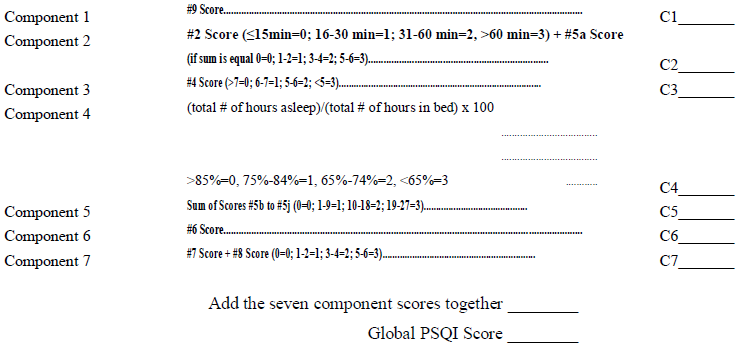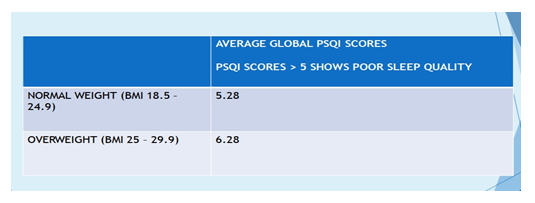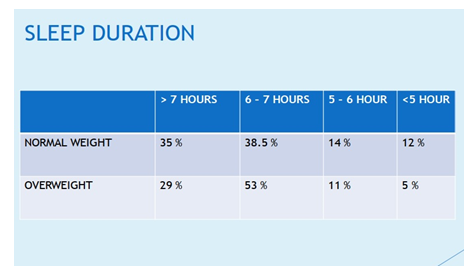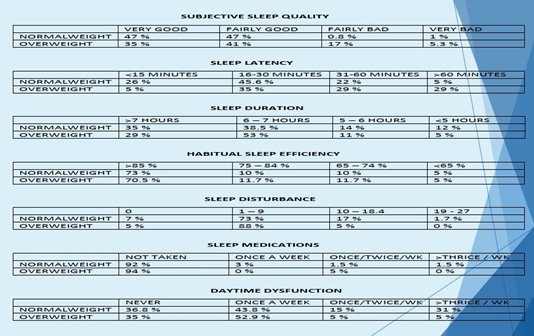Sleep Quality in Normal Weight and Overweight Individuals: A Cross-Sectional Survey
Article Information
Muhammad Sohaib Asghar1,*, Maira Hassan2, Sarah Kamran Akbani3, Nimra Shaikh2, Uzma Rasheed2, Mohammed Akram2, Nisar Ahmed2, Shahzad Ahmed2, Talha Zafar2, Muhammad Saleem4
1 Resident Physician of Internal Medicine at Dow University Hospital, Dow University of Health Sciences, Karachi, Pakistan
2 Intern of Internal Medicine at Liaquat National Hospital and Medical College, Karachi, Pakistan
3 Graduate, Jinnah Medical and Dental College, Karachi, Pakistan
4 Psychology, Dow University of Health Sciences, Karachi, Pakistan
*Corresponding author: Dr. Muhammad Sohaib Asghar, Resident Physician, Internal Medicine, Dow University Hospital, Dow University of Health Sciences, Karachi, Pakistan
Received: 17 August 2020; Accepted: 25 August 2020; Published: 27 August 2020
Citation: Muhammad Sohaib Asghar, Maira Hassan, Sarah Kamran Akbani, Nimra Shaikh, Uzma Rasheed, Mohammed Akram, Nisar Ahmed, Shahzad Ahmed, Talha Zafar, Muhammad Saleem. Sleep Quality in Normal Weight and Overweight Individuals: A Cross-Sectional Survey. Archives of Clinical and Biomedical Research 4 (2020): 413-420.
Share at FacebookAbstract
Sleep is an important part of one’s daily routine and sleeping less than 6 hours at night is considered decreased somnolence. The frequency of obesity is shooting up worldwide, mainly in developed countries. Obesity has become a very grave root cause of health issues in our society. Our study aims to find out the association between obesity and sleep, and the frequency of poor sleep quality among normal weight-bearing and overweight individuals. It was conducted as a cross-sectional, observational, questionnaire-based survey, a total of 380 subjects were randomly selected from the community. Sleep quality was compared among both the groups using standard validated scale questionnaire for sleep quality (Pittsburg Sleep Quality Index). Our study found out that out of 380 individuals who were being inquired 228 (60%) individuals were normal weight-bearing and 68 (30%) were overweight. Sleep quality was found to be impaired in 120 (52%) of normal-weight individuals as compared to 36 (45%) overweight individuals, although mean PSQI was higher in overweight’s (p=0.008). We further found that self-reported sleep duration was not different in normal as well as overweight individuals. The rate of poor sleep quality was found equal among male and female overweight individuals. It is concluded that sleep quality is dependent on various factors including sleep awareness, sleep hygiene, environment, and other factors that should be taken into account also regardless of the weight of the person. We also recommend that working on awareness regarding the importance of sleep and helping parents to establish an appropriate sleep routine for young children may be useful in preventing obesity.
Keywords
Obesity; Sleep; Over-weight; Body mass index; Somnolence; Insomnia
Obesity articles, Sleep articles, Over-weight articles, Body mass index articles, Somnolence articles, Insomnia articles
Article Details
1. Introduction
Sleep is an important part of your daily routine—we spend about one-third of the time doing it. Sleep is mainly of two types i.e. rapid eye movement sleep and non-rapid eye movement sleep. Circadian or Biological rhythm controls the sleep-wake cycle. It adjusts your timing of sleep and causes you to sleep at night and your ability to rise in the morning without an alarm [1]. Sleep has an important role in the immune system, brain, heart, lungs, metabolism, and mood. Poor quality sleep increases the risk of disorders including high blood pressure, cardiovascular disease, diabetes, depression, and obesity [2].
Different parts of the brain are responsible for sleep and its regulation. It includes the hypothalamus, a small peanut-sized structure inside the brain, acts as control centers affecting sleep and arousal. Within the hypothalamus is the suprachiasmatic nucleus (SCN); some people with disorders to the SCN sleep erratically throughout the day. The brain stem, at the base of the brain, communicates with the hypothalamus to control the transitions between wake and sleep. It produces a brain chemical called Gamma-aminobutyric acid (GABA), which acts to reduce the activity of arousal centers in the hypothalamus and the brain stem [3]. The brain stem (especially the pons and medulla) also plays a role in REM sleep; it sends signals to relax muscles essential for body posture and limb movements. The thalamus acts as a relay station for most of the information. During most stages of sleep, the thalamus becomes dormant. But during REM sleep, the thalamus is active, sending the cortex images, sounds, and other sensations that fill our dreams. The pineal gland, located within the brain’s two hemispheres, receives signals from the SCN and increases the production of the hormone melatonin, which helps to sleep. The basal forebrain, also promotes sleep and wakefulness, while part of the midbrain acts as an arousal system. The release of adenosine supports sleep drive. Caffeine counteracts sleepiness by blocking the actions of adenosine and can have disruptive effects on sleep [4]. The amygdala, an almond-shaped structure involved in processing emotions, becomes increasingly active during REM sleep [5].
Cytokines also plays part in sleep regulation that includes interleukin-1 β (IL1) and tumor necrosis factor α (TNF), as they are the best-recognized sleep regulatory substances (SRS) and many of their biochemical mechanisms are also implied in sleep regulation, e.g., adenosine, nitric oxide, prostaglandins, and others. IL1, TNF, and growth hormone-releasing hormone (GHRH) for non-rapid eye movement sleep (NREMS) and prolactin and nitric oxide (NO) for rapid eye movement sleep (REMS) [6].
Sleeping less than 6 hours at night is considered decreased somnolence [7]. Most healthy adults required 7 to 9 hours of daily sleep. Glucose metabolism and neuroendocrine function are also regulated by our sleep pattern and it affects our body in several ways [8]. Sleeping hours are less than normal in teens and reducing as they ages more [9]. The frequency of obesity is shooting up worldwide, mainly in developed countries [10]. Hormonal variation due to lack of sleep also becomes the origin of weight gain [9]. Nowadays the percentage of men and women between ages 30 and 64 years who complained about poor sleep quality is above 30%. This has become very regular ailment among adults [7]. Obesity has become a very grave root cause of health issues in our society [11]. This research finds out the association between obesity and sleep.
2. Methods
Our study aims to find the frequency of poor sleep quality among normal weight-bearing and overweight individuals. It was designed as a cross-sectional, observational, questionnaire-based study, in an outpatient department of a tertiary care hospital. A total of 380 subjects were randomly selected from the community (presenting to an outpatient department for any reason) and were given a questionnaire to be filled after consent. Sleep quality was compared among both the groups using standard validated scale questionnaire for sleep quality (Pittsburg Sleep Quality Index) [12]. Data were analyzed using SPSS version 25.0 and the p-value was set significant if less than 0.05. Inclusion criteria were age between 18–59 years and Body mass index (BMI) was taken between 18.5–29.9. Exclusion criteria were known major Illness including psychiatric disorders and BMI <18.5 or >30. A sample size 380 was calculated by the World Health Organization (W.H.O) sample size calculator, with a population size of 30000, confidence interval of 95%, response distribution as 50%, and margin of error 5%. The sample was collected through a non-probability consecutive sampling method. Data were presented as means and standard deviation if continuous, and in percentages if frequencies. Independent sample t-test was used to compare mean PSQI, while frequency groups were described through Descriptive statistics.
The Pittsburgh Sleep Quality Index (PSQI)
Instructions: The following questions relate to your usual sleep habits during the past month only. Your answers should indicate the most accurate reply for the majority of days and nights in the past month. Please answer all questions. During the past month,
- When have you usually gone to bed? ______________
- How long (in minutes) has it taken you to fall asleep each night? ______________
- When have you usually gotten up in the morning? ______________
- How many hours of actual sleep do you get at night? (This may be different than the number of hours you spend in bed)
______________
|
5. During the past month, how often have you |
Not during |
Less than |
Once or |
Three or |
|||
|
had trouble sleeping because you… |
the past |
once a |
twice a |
more times |
|||
|
month (0) |
week (1) |
week (2) |
week (3) |
||||
|
a. Cannot get to sleep within 30 minutes |
|||||||
|
b. Wake up in the middle of the night or early morning |
|||||||
|
c. Have to get up to use the bathroom |
|||||||
|
d. Cannot breathe comfortably |
|||||||
|
e. Cough or snore loudly |
|||||||
|
f. Feel too cold |
|||||||
|
g. Feel too hot |
|||||||
|
h. Have bad dreams |
|||||||
|
i. Have pain |
|||||||
|
j. Other reason(s), please describe, including how often you |
|||||||
|
have had trouble sleeping because of this reason(s): |
|||||||
|
6. During the past month, how often have you taken medicine |
|||||||
|
(prescribed or “over the counter”) to help you sleep? |
|||||||
|
7. During the past month, how often have you had trouble staying |
|||||||
|
awake while driving, eating meals, or engaging in social activity? |
|||||||
|
8. During the past month, how much of a problem has it been for |
|||||||
|
you to keep up enthusiasm to get things done? |
|||||||
|
Very |
Fairly |
Fairly |
Very |
||||
|
good (0) |
good (1) |
bad (2) |
bad (3) |
||||
|
9. During the past month, how would you rate your sleep |
|||||||
|
quality overall? |
|||||||

3. Results
Our study found out that out of 380 individuals who were being inquired 228 (60%) individuals were normal weight-bearing and 68 (30%) were overweight. Sleep quality was found to be impaired in 120 (52%) of normal-weight individuals as compared to 36 (45%) overweight individuals. We further found that self-reported sleep duration was not different in normal as well as overweight individuals. The rate of poor sleep quality was found equal among male and female overweight individuals. Our study concludes that sleep quality was found equally impaired (High Global PSQI score >5) in both the group of individuals (normal weight-bearing and overweight). The global Pittsburg Sleep Quality Index (PSQI) was comparatively found more in the overweight group (p=0.008), as shown in Figure 1. The frequency of sleep duration among normal weight and overweight is shown in Figure 2. Figure 3 summarizes the frequencies, responses, and scores obtained through PSQI questionnaires.
4. Discussion
Obesity is one of today’s most blatantly visible, yet most neglected, worldwide public health epidemic across all ages, sexes, and ethnic groups. Obesity is influenced by many factors, such as heredity, early life influences, familial dietary behaviors, little physical activity, and sleep. Sleep duration in humans has shown an overall decline for over a century; thus, the individuals in modern society sleep relatively fewer hours. Previous researches have concluded that poor sleep and sleep less than 7 hours are related to increasing Body mass index (BMI). This research presents the relationship between sleep duration and obesity.
Many studies conducted in the past have favored the relation of disturbed sleep and obesity [13, 14]. It is observed that short sleep duration was linked with an increased risk of obesity while long sleep duration has no role [15]. Hormones like leptin and ghrelin which are responsible for regulating appetite modifies by short sleep lead to elevated BMI [15]. Lack of sleep results in weariness and a decrease in physical activity. Changes in the circadian clock can have hazardous effects on the body’s metabolism [4]. Sleep also affects metabolism by acting on thermogenesis [4]. Lack of sleep alters various hormones. It increases ghrelin, hunger, and appetite while decreases leptin, insulin sensitivity, and glucose tolerance [16]. Balancing a healthy diet intake, socioeconomic status, and lifestyle did not alter the association [16]. Sleep duration also gets varied by sleep apnea [17]. Sleep apnea is also a potential contributor to obesity.
Insomniacs have more psychiatric comorbidity as compared to people with normal sleep duration and they have increased Adrenocorticotropic hormone (ACTH) and cortisol secretion than other groups of people [18]. Several drugs are introduced now to improve sleep quality such as benzodiazepines [18]. Naps interfere with nighttime sleep. If one experiencing problems in night time sleeping, napping may worsen it [19]. Sleep duration is a modifiable risk factor with important inference for the prevention of obesity and its remedy [20].
We recommend that working on awareness regarding the importance of sleep and helping parents to establish an appropriate sleep routine for young children may be useful in preventing obesity. The main limitation of this study included that it was cross-sectional and causations cannot be determined. We acknowledge that sleep surveys are subject to reporting biases. Wrist actigraphy was not used to measure sleep duration.
5. Conclusion
It is a dilemma that remains unsettled regarding poor sleep leads to being overweight and obesity or oversleeping leads to being overweight and obese. Furthermore, overweight people have got poor sleep quality but a normal weighted person is no more different in this scenario and was found experiencing equally disturbed sleep as do overweight people. Sleep quality is dependent on various factors including sleep awareness, sleep hygiene, environment, and other factors that should be taken into account also regardless of the weight of the person.
Disclosure Statement
The authors declare no conflicts of interest with this article's content.
Funding Statement
This work is not supported by any sponsors. No funding required in this study.
Ethical Approval Statement
Ethical approval was taken in this study from institutional review board, and consent to participate has been taken from all the patient’s guardian with informed written consent.
References
- Noh J. The Effect of Circadian and Sleep Disruptions on Obesity Risk. Journal of Obesity and Metabolic Syndrome 27 (2018): 78-83.
- Colten HR, Altevogt BM. Sleep Disorders and Sleep Deprivation: An Unmet Public Health Program. National Academies press (US) (2006): 2.
- Izac MSM. Basic Anatomy and Physiology of Sleep. American Journal of Electroneurodiagnostic Technology 46 (2006): 18-38.
- Patel SR, Malhotra A, White DP, et al. Association between Reduced Sleep and Weight Gain in Women. American Journal of Epidemiology 164 (2006): 947-954.
- Corsi-Cabrera M, Velasco F, Del Rio-Portella Y, et al. Human amygdala activation during rapid eye movements of rapid eye movement sleep: an intracranial study. J Sleep Res 25 (2016): 576-582.
- Clinton JM, Davis CJ, Zielinski MR, et al. Biochemical Regulation of Sleep and Sleep BioMarkers. Journal of Clinical Sleep Medicine 7 (2011): S38-S42.
- Knutson KL, Cauter EV. Associations between sleep loss and increased risk of obesity and diabetes. Annals of the NewYork Academy of Sciences 1129 (2008): 287-304.
- Beccuti G, Pannain S. Sleep and Obesity. Current opinion in clinical nutrition and metabolic care 14 (2011): 402-412.
- Gohil A, Hannon TS. Poor Sleep and Obesity: Concurrent Epidemics in Adolescent Youth. Frontiers in Endocrinology 9 (2018).
- Kobayashi D, Takahashi O, Deshpande, et al. Association between weight gain, obesity, and sleep duration: a large-scale 3-year cohort study. Springer 16 (2012): 829-833.
- Torres MR, Pablos Monzo A, Guzman Lujan JF, et al. Lifestyle and physical condition factors associated with gender-specific BMI in Spanish preadolescents. Nutricion Hospitalaria (2019).
- Buysse DJ, Reynolds CF, Monk H, et al. The Pittsburgh Sleep Quality Index: A new instrument for psychiatric practice and research. Journal of Psychiatric Research 28 (1989): 193-213.
- Kristi?evi? T, Štefan L, Sporiš G. The Associations between Sleep Duration and Sleep Quality with Body-Mass Index in a Large Sample of Young Adults. Int J Environ Res Public Health 15 (2018): 758.
- Hung HC, Yang YC, Ou HY, et al. The association between self-reported sleep quality and overweight in a Chinese population. Obesity (Silver Spring) 21 (2013): 486-492.
- Wu Y, Zhai L, Zhang D. Sleep duration and obesity among adults: a meta-analysis of prospective studies. Elsevier Sleep Medicine (2014): 456-1462.
- Shi Z, Taylor AW, Gill TK, et al. Short sleep duration and obesity among Australian children. BMC Public Health 10 (2010): 1-6.
- Berg JFVD, Neven AK, Tulen JHM, et al. Actigraphic sleep duration and fragmentation are related to obesity in the elderly: the Rotterdam Study. International Journal of Obesity 32 (2008): 1083-1090.
- Patel SR. Reduced sleep as an obesity risk factor. International Association for the Study of Obesity. Obesity Reviews 10 (2009): 61-68.
- Bell JF, Frederick J, Zimmerman. Shortened Nighttime Sleep Duration in Early Life and Subsequent Childhood Obesity. ARCH PEDIATR ADOLESC MED 164 (2010): 840-845.
- Chaput JP, Després JP, Bouchard C, et al. Sleep duration as a risk factor for the development of type 2 diabetes or impaired glucose tolerance: analyses of the Quebec Family Study. Sleep Med 10 (2009): 919-924.



